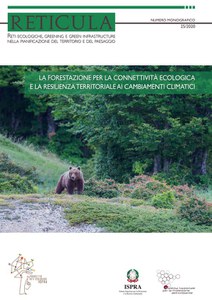RETICULA n. 25/2020 Monographic Number
Forestation for ecological connectivity and territorial resilience to climate change
Forests are considered among the most important biomes on the planet for their fundamental role in stabilizing the soil and climate, improving air quality, as well as the economic sectors that derive from their production, primarily but not exclusively wood. The environmental, social and economic roles of forests have multiplied and they are strongly involved in achieving the objectives of adaptation and mitigation of current environmental changes.
With the aim of improve the discussion and the useful reflection shared by the different involved actors for a sustainable forest management, the monographic issue 2020 of Reticula shows some articles on experiences of application of good practices and applied research that revolve around the conservation, enhancement and improvement of the vocations of the existing forest heritage and the planning and management of forest vegetation cover.
The articles contain different fields of application, sometimes apparently far from the collective imagination of this discipline, but which we believe will help the reader to build up an idea of innovative and ethical forest management that is in line with the perspectives of the new regulations concerning the forest heritage (TUFF, National Forest Strategy, Climate Decree) as well as the funding opportunities provided at European and national level.
Publication available only on-line
Download the publication (pdf 27,5 MB)
Summary
Preface by the Editorial Board of RETICULA
The Editorial
The right tree, in the right place and for the right purpose
by S. Borelli
The new national law on forests and forestry industry and the Italian forestry Strategy
A. Stefani
BOX – The FORITaly project
L. Caverni, R. Romano
Green infrastructures against land take
L. Sallustio, B. Lasserre, C. Blasi, M. Marchetti
The role of the Alpine Convention for a climate neutral and resilient forest system
L. Cetara, P. Angelini, P. La Malva, V. Sgambato, T. Bastiani
Urban Forestry and Ecosystem Services, the “Urban Forestry” project of the Piedmont Region
G.R. Pelassa, F. Petrella
BOX - Minimum environmental criteria for public green areas management and for the supply of related products
A. Pepe
From Constable to sustainable development: a forest supporting biodiversity among Emilian mills
M. Benedetti, L. Carra, R. Comolli, R. Figna, A. Pecci, O. Rossi, G. Sanesi
BOX - When species with big seeds are used for forestation
B. Piotto
Landscape suitability and connectivity for the Apennine brown bear in forest systems: critical issues, planning and management
D. Di Santo, P. Ciucci
Ecosystem services of phytoremediation plants
M. Fagnano
Urban planning, green infrastructures and Rural Development Programme (RDP): the novel approach of the urban plan of Reggiolo (RE)
G. Trentanovi, C. Santacroce, A. Rizzi
Towards an agroforestry park on the outskirts of Milan: analysis and proposals for ecological enhancement
G. Chiaffarelli, I. Vagge
BOX - Guidelines for the protection and valorisation of monumental trees
D. Giordano, R. Romano
The MADAMES-AX project: the forest ecosystem services between innovation and market opportunities
S. Pasetti, E. Mariano, S. Noce, M. Santini, C. Trotta, M. Folegani, A. Brunori, R. Simonelli
IoT sensors, AI, geo-referenced big data for the optimization of urban management and forestation practices
C Di Lonardo, S. Di Lonardo

